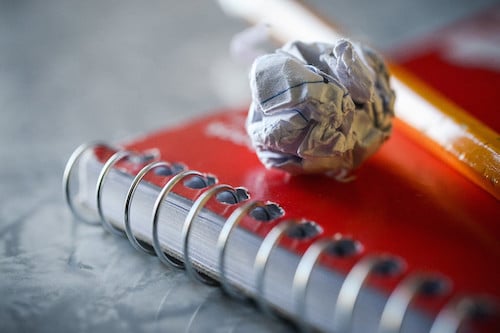Creative Writing 101 Pdf

The most common advice out there for being a writer is, "if you want to write, write." While this is true (and good advice), it's not always that easy, particularly if you're not writing regularly.
Whether you're looking for help getting started on your next project, or just want to spend 20 minutes being creative, writing prompts are great ways to rev up your imagination. Read on for our list of over 100 creative writing prompts!
feature image credit: r. nial bradshaw/Flickr
10 Short Writing Prompts
If you're looking for a quick boost to get yourself going, these 10 short writing prompts will do the trick.
#1: Write a scene starting with a regular family ritual that goes awry.
#2: Describe exactly what you see/smell/hear/etc, right now. Include objects, people, and anything else in your immediate environment.
#3: Suggest eight possible ways to get a ping pong ball out of a vertical pipe.
#4: A shoe falls out of the sky. Justify why.
#5: If your brain were a tangible, physical place, what would it be like?
#6: Begin your writing with the phrase, "The stage was set."
#7: You have been asked to write a history of "The Summer of [this past year]." Your publisher wants a table of contents. What events will you submit?
#8: Write a sympathetic story from the point of view of the "bad guy." (Think fractured fairy tales like Wicked or The True Story of the 3 Little Pigs!, although the story doesn't have to be a fairy tale.)
#9: Look at everyday objects in a new way and write about the stories one of these objects contains.
#10: One person meets a stranger on a mode of transportation. Write the story that ensues.
 What stories might be happening on this train?
What stories might be happening on this train?
11 Writing Prompts for Kids
Any of these prompts can be used by writers of any age, but we chose the following 11 prompts as ones that would be particularly fun for kids to write about. (Most of them I used myself as a young writer, so I can vouch for their working!)
#1: Include something falling in your writing.
#2: Write a short poem (or story) with the title, "We don't know when it will be fixed."
#3: Write from the perspective of someone of a different gender than you.
#4: Write a dumb internet quiz.
#5: Finish this thought: "A perfect day in my imagination begins like this:"
#6: Write a character's inner monologue (what they are thinking as they go about their day).
#7: Think of a character. Write a paragraph each about:
- An important childhood experience that character had.
- The character's living situation.
- Two hobbies or things the character likes to do.
- The room where the character sleeps.
- An ambition of the character.
- Two physical characteristics of the character.
- What happens when a second person and this character meet.
- Two important defining personal traits of this character.
#8: Start a story with a quote from a song.
#9: Begin a story with, "It was the summer of ______ when ______"
#10: Pretend everyday objects have no names. Think about what you would name them based on what they do, what you can use them for, and what they look like.
#11: Start a story with the phrases "My grandparents are/were," "My parents are/were," or "My mother/father/parent is/was."
 My grandfather was...skiing in his bathrobe and a Santa hat??
My grandfather was...skiing in his bathrobe and a Santa hat??
15 Cool Writing Prompts
#1: List five issues that you're passionate about. Write about them from the opposite point of view (or from the perspective of a character with the opposite point of view).
#2: Walk around and write down a phrase you hear (or read). Make a story out of it.
#3: Write using no adjectives or adverbs.
#4: Write a character's inner dialogue between different aspects of a character's self (rather than an inner monologue).
#5: Write a true story from your past that involves light or darkness in some way.
#6: "Saying goodbye awakens us to the true nature of things." Write something in which someone has to say goodbye and has a realization.
#7: Begin by writing the end of the story.
#8: Write a recipe for an intangible thing.
#9: Write a horror story about an ordinary situation (e.g., buying groceries, going to the bank, listening to music).
#10: Write a story from within a bubble.
#11: Write down 2-3 short character descriptions and then write the characters in conversation with one another.
#12: Write a story in second person.
#13: Write a story that keeps contradicting itself.
#14: Write about a character with at least three big problems.
#15: Write something that takes place on a Friday, the 13th (of any month).

15 Funny Writing Prompts
#1: Write a story which starts with someone eating a pickle and potato sandwich.
#2: Write a short script where the plot has to do with evil dolls trying to take over something.
#3: Write about writers' block.
#4: List five election issues that would be ridiculous to includes as part of your election platform (e.g. outlawing mechanical pencils and clicky pens, mandating every person over the age of 30 must own an emergency last rites kit). Choose one of the ridiculous issues and write a speech in favor of it.
#5: Write a children's story that is insanely inappropriate but can't use graphic language, curses, or violence.
#6: List five careers. Write about someone with one of those careers who wants to quit it.
#7: Write down a list of murder methods. Choose one at random from the list to use in a story.
#8: Write a romance story in which the hero must have a last name corresponding with a physical characteristic (e.g. Jacques Hairyback or Flora Dimple).
#9: Come up with 10 different ways to:
- say hello
- order a pizza
- congratulate someone on a job well done
- apologize
- return to the store something that's broken
#10: Search for "random Renaissance painting" (or any other inspirational image search text you can think of) on any online internet image search engine. Picking one image, write half a page each of:
- Statements about this image (e.g. "I meant bring me the BREAD of John the Baptist").
- Questions about this image (e.g. "How many of those cherubs look like their necks are broken?").
- Explanations of this image (e.g. "The painter ran out of blue paint halfway through and had to improvise for the color of the sky").
- Commands said by people in this image or about this image (e.g. "Stop telling me to smile!" or "Bring me some gasoline!").
#11: Write starting with a word that sounds like "chute" (e.g. "chute," "shoot," "shooed").
#12: Write about a character named X "The [article of clothing]" Y (e.g. Julie "The Yellow Darted Skirt" Whyte) or simply referred to by their clothing (e.g. "the man in the brown suit" or "the woman in black").
#13: Write down a paragraph each describing two wildly different settings. Write a story involving both settings.
#14: Think of a fictional holiday based around some natural event (e.g. the Earth being at its farthest point from the sun, in memory of a volcanic eruption, that time a cloud looked like a rabbit riding a bicycle). Write about how this holiday is celebrated.
#15: Write a "Just-So" type story about a fictional creature (e.g. "how the dragon got its firebreath" or "how the mudkip got its cheek gills").
 You can also try to write a Just-So story for the modern era, like "How the Computer Got Its Mouse"or How the Owl...Got Its Headphones? wait what
You can also try to write a Just-So story for the modern era, like "How the Computer Got Its Mouse"or How the Owl...Got Its Headphones? wait what
54 Other Writing Prompt Ideas
#1: Borrow a character from some other form of media (or create your own). Write from that character's perspective.
#2: Write for and against a non-consequential controversy (e.g., salt vs. pepper, Mac vs. PC, best kind of door).
#3: Choose an ancestor or a person from the past to write about or to.
#4: Write a pirate story with a twist.
#5: Have a character talk about another character and their feelings about that other character.
#6: Pick a season and think about an event in your life that occurred in that season. Write a creative nonfiction piece about that event and that season.
#7: Think of something very complicated and long. Write a page about it using short sentences.
#8: Write a story as a dream.
#9: Describe around a food without ever directly naming it.
#10: Write a monologue (one character, talking to the audience/reader) (*not* an inner monologue).
#11: Begin a story with the phrase, "It only took five seconds to..."
#12: List five strong emotions. Choosing one, write about a character experiencing that emotion, but only use the character's actions to convey how they are feeling (no outright statements).
#13: Write a chapter of the memoir of your life.
#14: Look through the (physical) things you're currently carrying with you or wearing. Write about the memories or emotions tied with each of them.
#15: Go be in nature. Write drawing your story from your surroundings (both physical, social, and mental/emotional).

#16: Write from the perspective of a bubble (or bubble-like creature).
#17: A person is jogging along an asphalt road. Write a story.
#18: Title your story (or poem, or play, etc) "Anti-_____". Fill in the blank and write the story.
#19: Write something that must include an animal, a mineral, and a vegetable.
#20: Begin your writing with the phrase, "6 weeks later..."
#21: List 5-10 office jobs. Pick one of them and describe a person working in that job as if you were a commentator on an Olympic sporting event.
#22: Practice your poetic imagery: overwrite a description of a character's breakfast routine.
#23: Write about a character (or group of characters) trying to convince another character to try something they're scared of.
#24: Keep an eye out in your environment for examples of greengrocer's apostrophes and rogue quotation marks. Pick an example and write about what the misplaced punctuation implies (e.g., we have the "best" meat or we have the best "meat").
#25: Fill in the blank with the first word that comes to mind: "_______ Riot!" Write a newspaper-style article describing the events that that took place.
#26: Write from the point of view of your most-loved possession. What does it think of you?
#27: Think of five common sayings (e.g., "An apple a day keeps the doctor away"). Write a horror story whose plot is one of those common sayings.
#28: Write a scene in which two characters are finally hashing out a long-standing misunderstanding or disagreement.
#29: You start receiving text messages from an unknown number. Tell the story of what happens next.
#30: Write one character bragging to another about the story behind their new tattoo.
#31: Superheroes save the world...but they also leave a lot of destruction in their wake. Write about a normal person in a superhero's world.
#32: Sometimes, family is who we are related to; sometimes, family is a group of people we gather around ourselves. Write a story about (some of) a character's found family and relatives meeting for the first time.
#33: Write a story that begins in the middle of the plot's action (en media res).
#34: Everyone says you can never have too much of a good thing. Write a story where that isn't true.
#35: What do ghosts do when they're not creating mischief? Write about the secret lives of ghosts.
 This particular ghost seems to be going on an epic quest to...photograph some ancient artifacts and not steal them? Look, fiction can be whatever you want it to be.
This particular ghost seems to be going on an epic quest to...photograph some ancient artifacts and not steal them? Look, fiction can be whatever you want it to be.
#36: Every year, you dread the last week of April. Write a story about why.
#37: Write a story about what it would be like to have an animal sidekick in real life.
#38: Heists don't just have to be black-clad thieves stealing into vaults to steal rare art or money. Write about a group of people (adults or children) who commit a heist for something of seemingly little monetary value.
#39: "Life is like a chooseable-path adventure, except you don't get to see what would have happened if you chose differently." Think of a choice you've made and write about a world where you made a different choice.
#40: Write a story about a secret room.
#41: You find a message in a bottle with very specific directions. Write a story about the adventure you embark upon.
#42: "You'll always be okay as long as you know where your _______ is." Fill in the blank and write a story (either fictional or from your life) illustrating this statement.
#43: Forcing people into prolonged proximity can change and deepen relationships. Write about characters on a road trip together.
#44: In music, sonata form includes three main parts: exposition, development, and recapitulation. Write a short story that follows this format.
#45: Begin writing with a character saying, "I'm afraid this simply can't wait."
#46: Write a story with a happy ending (either happily-ever-after or happy-for-now).
#47: Write about a character before and after a tragedy in that character's life.
#48: Choose an object or concept you encounter in everyday life (e.g. tables, the feeling of hot or cold, oxygen) and write an infomercial about it.
#49: "Life is a series of quests, whether important or mundane." Write about a quest you've gone on (or would like to go on, or will have to go on).
#50: List 10 different ways to learn. Choose one (or more) and write a story where a character learns something using that one (or more) method.
#51: You've been called to the principal's office for bad behavior. You know what you did. Explain and justify yourself.
#52: A character discovers their sibling owns a cursed object. Write about what happens next.
#53: Write a character description by writing a list of items that would be on a scavenger hunt about them.
#54: The slogan for a product or service you're advertising is, "Kid-tested, _____." Fill in the blank and write the copy for a radio or podcast advertisement for your product.
 Touching a goat: Kids-tested
Touching a goat: Kids-tested
How to Use Creative Writing Prompts
There's no wrong way to use a creative writing prompt (unless it's to harass and hurt someone)—the point of them is to get you writing and your imagination flowing.
To help you get the most out of these writing prompts, however, we've come up with the six tips below. Try them out!
#1: DON'T Limit Yourself to Prose
Unless you're writing for a particular assignment, there's no reason everything you write in response to a writing prompt has to be prose fiction. Instead of writing your response to a prompt as a story, try writing a poem, nonfiction essay, play, screenplay, or some other format entirely.
You never know what combination of prompt and medium will spark your next great poem/story/play/nonfiction essay! Plus, taking a break from writing in the same format all the time might make you think about story structure or language in a different way.#2: DON'T Edit as You Write
The purposes of writing prompts is to get you writing, typos and weird grammar and all. Editing comes later, once you've finished writing and have some space from it to come back to what you wrote.
It's OK to fix things that will make it difficult to read what you've written (e.g., a weird autocorrect that changes the meaning of a sentence), but don't worry too much about typos or perfect grammar when you're writing; those are easy enough to fix in edits. You also can always insert asterisks or a short note as you're writing to remind yourself to go back to fix something (for instance, if as you're writing it seems like you want to move around the order of your paragraphs or insert something earlier).
#3: DO Interpret the Prompt Broadly
The point of using a writing prompt is not to write something that best exemplifies the prompt, but something that sparks your own creativity. Again, unless you're writing in response to an assignment with specific directions, feel free to interpret writing prompts as broadly or as narrowly as you want.
For instance, if your prompt is to write a story that begins with "The stage was set," you could write about anything from someone preparing to put a plan into motion to a literal theatre stage constructed out of pieces of old sets (or something else entirely).
If you're using a writing prompt, it doesn't have to be the first sentence of your story or poem, either; you can also use the prompt as a goal to work towards in your writing.
#4: DO Try Switching Up Your Writing Methods
If it's a possibility for you, see if you write differently in different media. Do you write the same kind of stories by hand as you would typing at a computer? What about if you dictate a story and then transcribe it? Or text it to a friend? Varying the method you use to write can affect the stories you're able to tell.
For example, you may find that it's easier for you to tell stories about your life to a voice recorder than to try to write out a personal essay. Or maybe you have trouble writing poetry, but can easily text yourself or a friend a poem. You might even find you like a writing method you've not tried before better than what you've been doing!

#5: DO Mix and Match Prompt Ideas
If you need more inspiration, feel free to combine multiple prompts (but don't overwhelm yourself with too much to write about).
You can also try switching genres from what might be suggested in the prompt. For instance, try writing a prompt that seems funny in a serious and sad way, or finding the humor in something that otherwise seems humorless. The categories we've organized the prompts into are by no means limiters on what you're allowed to write about.
#6: DO Try to Write Regularly
The more regularly you write, the easier it will be to write (with or without writing prompts).
For some people, this means writing daily; for others, it means setting aside time to write each weekend or each month. Set yourself an achievable goal (write 2x a week, write 1000 words a month) and stick to it. You can always start small and then ramp your wordcount or frequency up.
If you do better when you have something outside yourself prompting to write, you may also want to try something like morning pages, which encourages you to write at least 750 words every day, in any format (story, diary entry, social media postings, etc).

What's Next?
Thinking about attending college or grad school for creative writing? Our articles on whether or not you should major in creative writing and the best creative writing programs are there for you! Plus, if you're a high schooler, you should check out these top writing contests.
Creative writing doesn't necessarily have to be fiction. Check out these three examples of narrative writing and our tips for how to write your own narrative stories and essays.
Just as writing prompts can help give form to amorphous creative energy, using specific writing structures or devices can be great starting points for your next story. Read through our discussion of the top 20 poetic devices to know and see if you can work at least one new one into your next writing session.
Still looking for more writing ideas? Try repurposing our 100+ easy drawing ideas for characters, settings, or plot points in your writing.
Source: https://blog.prepscholar.com/creative-writing-prompts
0 Response to "Creative Writing 101 Pdf"
Post a Comment